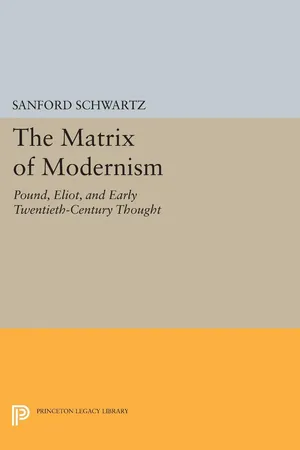
The Matrix of Modernism
Pound, Eliot, and Early Twentieth-Century Thought
- 248 pages
- English
- PDF
- Available on iOS & Android
About this book
Sanford Schwartz situates Modernist poetics in the intellectual ferment of the early twentieth century, which witnessed major developments in philosophy, science, and the arts. Beginning with the works of various philosophers--Bergson, James, Bradley, Nietzsche, and Husserl, among others--he establishes a matrix that brings together not only the principal characteristics of Modernist/New Critical poetics but also the affiliations between the Continental and the Anglo-American critical traditions.
Originally published in 1985.
The Princeton Legacy Library uses the latest print-on-demand technology to again make available previously out-of-print books from the distinguished backlist of Princeton University Press. These editions preserve the original texts of these important books while presenting them in durable paperback and hardcover editions. The goal of the Princeton Legacy Library is to vastly increase access to the rich scholarly heritage found in the thousands of books published by Princeton University Press since its founding in 1905.
Frequently asked questions
- Essential is ideal for learners and professionals who enjoy exploring a wide range of subjects. Access the Essential Library with 800,000+ trusted titles and best-sellers across business, personal growth, and the humanities. Includes unlimited reading time and Standard Read Aloud voice.
- Complete: Perfect for advanced learners and researchers needing full, unrestricted access. Unlock 1.4M+ books across hundreds of subjects, including academic and specialized titles. The Complete Plan also includes advanced features like Premium Read Aloud and Research Assistant.
Please note we cannot support devices running on iOS 13 and Android 7 or earlier. Learn more about using the app.
Information
Table of contents
- Cover
- Contents
- Acknowledgments
- Introduction
- I "This Invented World": Abstraction and Experience at the Turn of the Century
- II Elements of the New Poetics
- III Ezra Pound: Cultural Memory and the Visionary Imagination
- IV Incarnate Words: Eliot's Early Career
- Conclusion: T he New Criticism and Beyond
- Notes
- Index